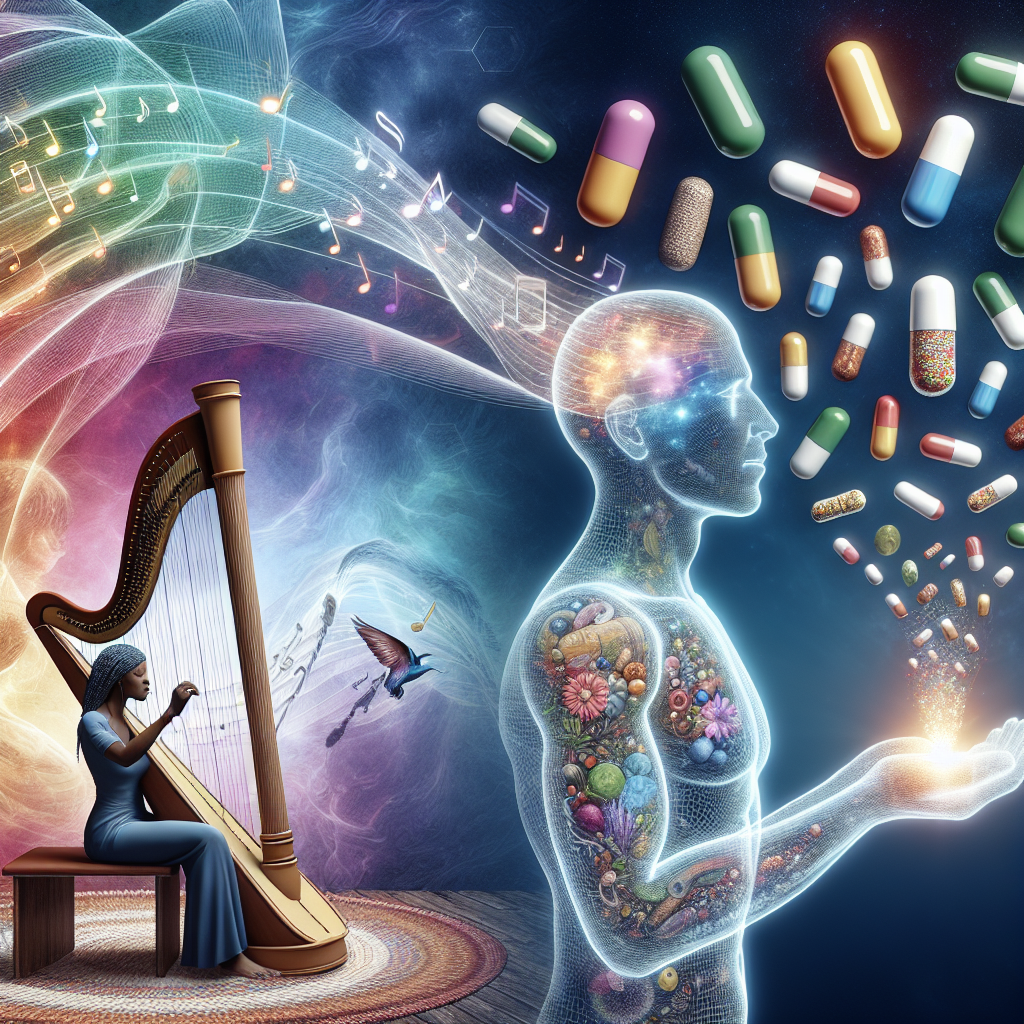How Music Therapy and Vitamins Work Together for Healing

Discover the powerful healing combination of music therapy and vitamins. Learn how these two elements work together to promote overall wellness and recovery. Visit www.myvibrantvitality.com to start your healing journey today.
The Synergistic Effects of Music Therapy and Vitamins on Healing
Music therapy and vitamins, two seemingly disparate elements, have been found to work in harmony to promote healing. This unique combination of sound and nutrition has been shown to have a synergistic effect on the body, enhancing both physical and mental well-being.
Music therapy, a form of expressive arts therapy, uses music to improve and maintain the physical, psychological, and social well-being of individuals. It involves a range of activities, from listening to music and playing a musical instrument to singing and composing songs. The therapeutic benefits of music have been recognized for centuries, with its ability to reduce stress, alleviate pain, enhance memory, and improve communication.
On the other hand, vitamins are essential nutrients that our bodies need in small amounts to work properly. They play a crucial role in maintaining good health and wellbeing, contributing to various bodily functions such as immunity, digestion, and metabolism. Vitamins are also known to aid in the healing process, helping the body repair damaged tissues and cells.
When combined, music therapy and vitamins can have a profound impact on healing. The soothing effects of music can help reduce stress and anxiety, which are known to impede the healing process. By lowering stress levels, the body can focus more on healing. Moreover, music can stimulate the release of endorphins, the body’s natural painkillers, providing relief from pain and discomfort.
Simultaneously, the intake of vitamins can boost the body’s healing capabilities. For instance, Vitamin C is known for its role in collagen production, a protein that helps in the healing of wounds. Vitamin A aids in the repair and growth of body tissues, while Vitamin E has antioxidant properties that protect cells from damage.
The combination of music therapy and vitamins can also have a positive effect on mental health. Music therapy can help individuals express their feelings and emotions, providing a sense of relief and relaxation. It can also improve cognitive functions, such as attention and memory. Meanwhile, certain vitamins, like B vitamins, are known to support brain health and mood regulation.
The synergistic effects of music therapy and vitamins can be particularly beneficial for individuals recovering from surgery or illness. The calming effects of music can help patients relax and cope with the stress and anxiety associated with recovery. At the same time, vitamins can support the body’s healing process, promoting faster recovery.
In conclusion, the combination of music therapy and vitamins presents a holistic approach to healing. It addresses not only the physical aspects of healing but also the psychological and emotional components. This synergy of sound and nutrition provides a comprehensive healing environment, promoting overall well-being and recovery.
While more research is needed to fully understand the synergistic effects of music therapy and vitamins on healing, the existing evidence suggests that this combination can be a powerful tool in promoting health and well-being. As we continue to explore the potential of this unique combination, we may discover new ways to enhance the healing process and improve the quality of life for individuals worldwide.
Exploring the Connection Between Music Therapy and Vitamin Intake for Enhanced Recovery

Music therapy and vitamin intake may seem like two disparate elements, but they are increasingly being recognized for their combined potential in promoting healing and recovery. This article explores the intriguing connection between these two seemingly unrelated fields and how they can work together to enhance recovery.
Music therapy, a burgeoning field in healthcare, uses music interventions to address physical, emotional, cognitive, and social needs of individuals. It is a non-invasive and enjoyable method that has been found to reduce stress, alleviate pain, enhance memory, and improve communication. On the other hand, vitamins, essential nutrients that our bodies need for proper functioning, play a crucial role in maintaining health and aiding recovery. They boost the immune system, support growth and development, and help organs function properly.
The connection between music therapy and vitamin intake lies in their shared goal of promoting overall well-being and aiding recovery. Both music therapy and vitamins work to strengthen the body’s natural defenses and enhance its capacity to heal.
Music therapy can stimulate the production of certain chemicals in the brain that promote healing and well-being. For instance, it can trigger the release of endorphins, the body’s natural painkillers, and serotonin, a neurotransmitter that contributes to feelings of happiness and well-being. This can help reduce stress and anxiety, which are known to impede healing and recovery.
Similarly, vitamins, particularly the B-complex vitamins, are known to support brain health. They aid in the production of neurotransmitters, improve nerve function, and can even help reduce the risk of certain brain disorders. When combined with music therapy, they can potentially enhance its effects by ensuring that the brain is functioning optimally.
Moreover, music therapy can also enhance the body’s absorption of vitamins. Stress and anxiety can interfere with the body’s ability to absorb nutrients from food. By reducing stress and promoting relaxation, music therapy can help improve digestion and nutrient absorption, including vitamins. This can further enhance recovery and healing.
Furthermore, certain vitamins, such as vitamin D, are known to enhance mood and combat depression. When combined with music therapy, which also has mood-enhancing effects, they can potentially offer a powerful tool for promoting mental health and well-being.
In conclusion, while music therapy and vitamin intake may seem like two disparate elements, they share a common goal of promoting health and well-being. They both work to strengthen the body’s natural defenses, enhance mood, and promote healing. When used together, they can potentially offer a powerful tool for enhancing recovery and promoting overall health.
However, it’s important to note that while the connection between music therapy and vitamin intake is promising, more research is needed to fully understand their combined effects. As always, it’s recommended to consult with a healthcare professional before starting any new therapy or supplement regimen.
The exploration of the connection between music therapy and vitamin intake for enhanced recovery is an exciting new frontier in healthcare. It offers a holistic approach that recognizes the interconnectedness of our physical, emotional, and mental health. As we continue to learn more about this connection, we can look forward to new and innovative ways to promote healing and well-being.
The Role of Music Therapy and Vitamins in Holistic Healing Approaches
Music therapy and vitamins, two seemingly disparate elements, have been found to work in harmony to promote healing. This unique combination is gaining traction in the realm of holistic healing, a field that emphasizes the treatment of the whole person, including physical, emotional, mental, and spiritual aspects. The integration of music therapy and vitamins into a comprehensive wellness plan can yield significant benefits, enhancing both physical health and emotional well-being.
Music therapy, a clinical and evidence-based health profession, uses music interventions to accomplish individualized goals within a therapeutic relationship. It can help to alleviate pain, reduce stress, improve mood, and even enhance cognitive functioning. The power of music to heal and soothe is well-documented. It can stimulate the release of endorphins, the body’s natural painkillers, and promote relaxation by slowing heart rate and lowering blood pressure.
On the other hand, vitamins play a crucial role in maintaining good health and wellbeing. They are essential for the body’s normal growth and development, and each vitamin has specific roles in the body’s functioning. For instance, Vitamin C boosts the immune system, Vitamin A supports vision and skin health, while B vitamins aid in energy production. A deficiency in any of these essential nutrients can lead to various health problems.
When music therapy and vitamins are combined in a holistic healing approach, they can complement each other to promote overall wellness. Music therapy can help to create a positive environment that encourages the body to absorb vitamins more effectively. For instance, it has been found that stress can interfere with the body’s ability to absorb nutrients. By reducing stress levels, music therapy can enhance the body’s capacity to utilize vitamins, thereby promoting better health.
Moreover, certain vitamins can enhance the benefits of music therapy. For example, B vitamins, known for their role in brain health, can enhance the cognitive benefits of music therapy. They can help to improve memory, attention, and other cognitive functions, which can be particularly beneficial for individuals undergoing music therapy for cognitive impairments.
Furthermore, music therapy can also help to manage the side effects of vitamin deficiencies. For instance, a deficiency in Vitamin D can lead to mood disorders such as depression and anxiety. Music therapy can help to alleviate these symptoms by promoting relaxation and improving mood.
In conclusion, the combination of music therapy and vitamins in a holistic healing approach can offer a multitude of benefits. While music therapy can create a positive environment that enhances the body’s ability to absorb and utilize vitamins, certain vitamins can also enhance the benefits of music therapy. Moreover, music therapy can help to manage the side effects of vitamin deficiencies. This unique combination of music therapy and vitamins underscores the importance of a holistic approach to health and wellness, which considers the interconnectedness of physical, emotional, mental, and spiritual aspects of health. As research continues to explore this fascinating intersection, it is clear that the harmony between music therapy and vitamins holds great potential for promoting healing and wellness.